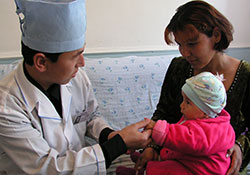Children at home and in primary health care

WHO/Malin Bring
WHO/Europe approaches the care of young children through the Integrated Management of Childhood Illness (IMCI) strategy, which aims to reduce mortality and morbidity from the most common childhood diseases and promote their healthy growth and development. IMCI provides guidance for management of sick and healthy children and advice for parents about care for children at home. It has a component that supports reforming of health services and promotes quality improvements at the primary care level.
Integrated child care
Central to IMCI is integrated case management for the main causes of childhood lethality and morbidity: acute respiratory infections (ARI), diarrhea, measles, neonatal conditions and malnutrition. This includes a range of preventive and curative interventions to improve practice both in the health facility and at home.
Introduced to the WHO European Region in 1999, IMCI is being implemented in 14 Member States, including those with higher mortality and limited resources. It tackles under-5 mortality, inequities in services (such as differences between rich and poor, rural and urban populations), quality of care and more efficient use of resources. Adapted IMCI clinical guidelines help to address such serious problems as common antibiotic abuse, unnecessary treatment and unjustified hospitalizations of children.
Interventions
The main interventions include:
- strengthening health care professionals’ skills through clinical training;
- introducing the guidelines into the medical training curricula;
- integrating standardized care in primary health care and promoting rational use of medicines;
- strengthening the quality of essential primary health care services and legislative reforms;
- improving community and family practices, including care for early childhood development; and
- monitoring the quality of care and providing supportive supervision.
WHO/Europe provides support through promoting:
- adaptation of evidence-based guidelines for primary care, emphasizing essential curative and preventive interventions (immunization, nutritional and growth standards, care for social. emotional and cognitive development and counselling caretakers), to country needs
- adaptation and use of modern electronic training tools such as IMCI Training and Adaptation Tool (ICATT) and its introducing into curricula of pre-service and post-diploma training for health professionals;
- capacity building a basic package of essential health services for children;
- early childhood development (ECD) in the context of IMCI care;
- evaluation of the quality of IMCI integration and identification of organizational barriers;
- assessment and improvement of child rights in primary care provision; and
- development and implementation of guidance and tools on supportive supervision in child health services.
A way forward
At the regional consultation on Child Health Redesign in Copenhagen in November 2017, on behalf of the European region, stakeholders agreed on the relevance and importance of developing technical guidelines and additional guidance materials for practitioners working with children and adolescents at primary health care level. The main competencies for providers identified were disease prevention and health promotion, child rights provision, and mental health. Specific competencies for child health area were also defined, namely ECD, child maltreatment, chronic conditions, over- and under-nutrition, tuberculosis and adolescent health.



